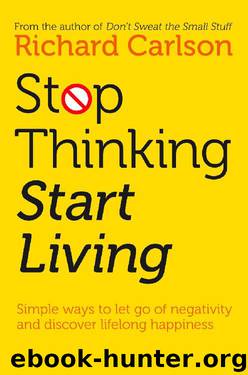Stop Thinking, Start Living: Discover Lifelong Happiness by Richard Carlson

Author:Richard Carlson [Carlson, Richard]
Language: eng
Format: epub
ISBN: 9780007383092
Publisher: HarperCollins Publishers
Published: 2012-08-01T18:30:00+00:00
This is an example of the power of moods. Believe it or not, these types of conversations are very common, not just in a professional setting, but in everyday life. Doesn’t it seem as if entirely different people are talking? It’s because this person is seeing and experiencing life differently in different moods. In low moods, your own thinking is always dark and pessimistic. If you look into your past when you are low you will see a painful past, your life will seem to have been a waste. If you look towards the future, your life will appear hopeless. Interestingly, however, when you look to your past when your mood is higher, it appears far happier than it did in a lower mood. The same is true with regard to your future. The higher the mood, the more hopeful it appears.
The reason I taped my client’s conversations was to show him the delusionary quality of his own moods, to show him firsthand how his low moods distort his vision of life. In terms of escaping unhappiness, the important point here is simple: the negative thoughts that fill your mind in a low mood are the cause of your suffering – and those thoughts almost always contain gross distortions. Although the thoughts you have while in a low mood seem valid to you, they aren’t. They are almost always irrational and distorted. When you start to see the inevitability of negative thinking when you feel bad, you can begin to distrust and ignore what you are thinking in the same way that you would ignore a mirage in a desert. When my client listened to his own voice it became very obvious to him: ‘Wow,’ he said, in a somewhat shocked tone. ‘I can’t believe that was me.’ Far more important, however, was the fact that he could now see, for the first time, that his thinking in his low moods was and always had been ‘pathetic’ (his word). He realized that to believe his own thinking when he was in a low state was ‘crazy’, a self-written prescription for pain and suffering. When he is low, he simply can’t see life clearly. His vision of life is distorted, and he’s far better off clearing his mind and turning off his thinking.
What makes understanding moods so difficult is that every time you are low, you will feel justified and certain that the way you are feeling is appropriate and necessary. You will feel a sense of urgency and self-righteousness and you will want so badly to believe in what you are thinking. The only way out is to see the absolute absurdity of believing in what you are thinking and feeling when you are low, and then making a commitment to yourself to ignore your own thoughts whenever you find yourself in such a state. You must understand that your thoughts, in a low-feeling state, are not worth paying attention to. They can only hurt you since they contain only gross distortions.
Download
This site does not store any files on its server. We only index and link to content provided by other sites. Please contact the content providers to delete copyright contents if any and email us, we'll remove relevant links or contents immediately.
Hit Refresh by Satya Nadella(9132)
The Compound Effect by Darren Hardy(8965)
Change Your Questions, Change Your Life by Marilee Adams(7780)
Nudge - Improving Decisions about Health, Wealth, and Happiness by Thaler Sunstein(7706)
The Black Swan by Nassim Nicholas Taleb(7128)
Deep Work by Cal Newport(7082)
Rich Dad Poor Dad by Robert T. Kiyosaki(6632)
Daring Greatly by Brene Brown(6512)
Principles: Life and Work by Ray Dalio(6445)
Playing to Win_ How Strategy Really Works by A.G. Lafley & Roger L. Martin(6299)
Man-made Catastrophes and Risk Information Concealment by Dmitry Chernov & Didier Sornette(6019)
Big Magic: Creative Living Beyond Fear by Elizabeth Gilbert(5771)
Digital Minimalism by Cal Newport;(5764)
The Myth of the Strong Leader by Archie Brown(5507)
The Slight Edge by Jeff Olson(5417)
Discipline Equals Freedom by Jocko Willink(5389)
The Motivation Myth by Jeff Haden(5212)
The Laws of Human Nature by Robert Greene(5208)
Stone's Rules by Roger Stone(5087)
